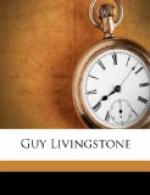Why is it that the great proportion of our pastors seem to conspire together with one consent to make the periodical duty of listening to them as hard as possible? Can they imagine there is profit or pleasure in a discourse wandering wearily round in a circle, or dragging a slow length along of truisms and trivialities? In the best of congregations there can be but few alchemists; and, without that science, who is to extract the essence of Truth from the moles incongesta of crass moralities?
To persuade or dissuade you must interest the head or the heart. I admire those who can do either successfully, but I do protest against those clerical tyrants who shelter themselves behind their license to fire at us their ruthless platitudes. If such could only struggle against that strong temptation of our fallen nature—the delight of hearing one’s own sweet voice—so as to concentrate now and then! The best orators, spiritual and mundane, have been brief sometimes.
I am no theologian, but I take leave to doubt if, in the elaborate divinity of fourteen epistles, the apostle of the Gentiles ever went so straight to his hearer’s heart as in that farewell charge, when the elders of Ephesus gathered round him on the sea-sand, “Sorrowing most of all for the words that he spake, that they should see his face no more.”
Do you remember Canning and the clergyman? When the latter asked him, “How did you like my sermon? I endeavored not to be tedious;” I always fancy the statesman’s weary, wistful look, which would have been compassionate but for a sense of personal injury, as he answered, in his mild voice, “And yet—you were.”
Well, the flirtation went on its way rejoicing, to the intense amusement of all of us, especially of Forrester, till one day his cousin came into Guy’s study, who had just returned from hunting, looking rather frightened, like a child who has let fall a valuable piece of china—it was only an honest man’s heart that she had broken. Slowly the truth came out; Mr. Foster had proposed to her that afternoon in the park.
We, far off in the drawing-room, heard the shrill whistle with which Livingstone greeted the intelligence.
“You accepted him, of course?” he said.
“O Guy!” Miss Raymond answered, blushing more than ever. (I’ll back a woman against the world for expressing half a chapter by a simple interjection; Lord Burleigh’s nod is nothing to it.) “But, indeed,” she went on, “I’m very sorry about it; I never saw any one look so unhappy before. Do you know I think I saw the tears standing in his eyes; and I only guessed at the words when he said ‘God bless you!’”




